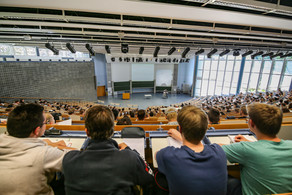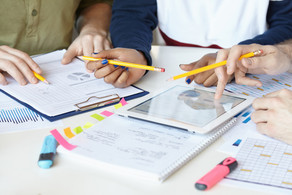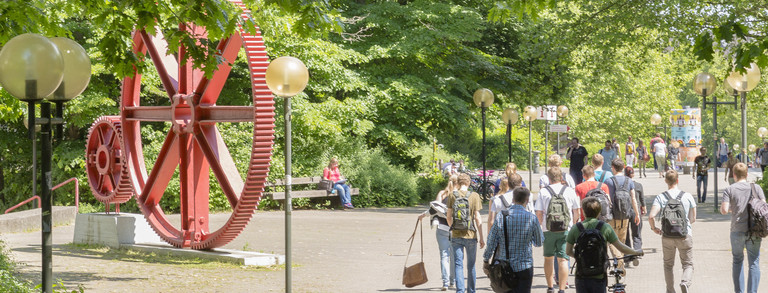Language and communication
One research focus of the Department of Language & Communication concerns the phenomenon of multilingualism and, in particular, the development of language competence in children growing up multilingually. Various research projects pursue different objectives, focusing on prevention and diagnostics as well as support. Special attention is paid to the individual context with the respective linguistic input in which children grow up multilingually. For example, the radio play series Die Wetterschacht-Detektive (The Weather Shaft Detectives) was developed and evaluated. Currently, one focus is on the diagnosis and prevention of language development disorders (SES) in children with German as a second language.
For example, some screening tools developed in an international project are being tested by us in different age cohorts of multilingual children. In particular, non-word repetition, subject-verb congruence, and case marking are being investigated. The latter two linguistic phenomena are also the focus of another research project, which investigates language processing in children with developmental language disorders. The long-term goal of the project is to be able to preventively determine the risk of developing SES in children with German as a second language, even before they themselves communicate extensively in their second language.
In addition to these early childhood and preschool focal points, another project focuses on the early primary level. Here, the multilingual acquisition of word formation skills in the first two years of school attendance is being researched. The long-term goal is to develop multilingualism-sensitive support concepts for the common classroom, which are based on empirically founded research results on this area of educational language.
In the context of multilingualism research, students can participate with theses (Bachelor or Master).
Contact: Jun.-Prof. Anna-Lena Scherger
Further information:
- Homepage of the Department of Language and Communication - Multilingualism.
- Multilingual Contexts 2.0: Recording the Input Conditions of Children Growing Up Multilingually
- The Weather Shaft Detectives (radio play)
The main focus of the Department of Language & Communication is the study of child language development. Early language and communication skills have a key function for later school performance abilities and are closely related to other developmental areas. Especially with regard to early intervention and support of children with language developmental delays or disorders, the identification of factors influencing language development is highly relevant. Therefore, several years ago we started to build up a panel for a longitudinal study, which was financed by the German Research Foundation for the first six years and since then by budgetary funds. The long-term goal of this Dortmund longitudinal study is to identify those factors that have been shown to be predictive of the development of language and cognitive performance as well as of later school performance (such as mathematical ability). A group of approximately 40 children (growing up monolingual with German) is continuously observed in half-year and yearly steps since infancy (12 months old in 2012) and examined with respect to age-relevant abilities related to language.
A pioneering finding of the study points to the connection between the type of gestural communication in pre-linguistic infancy and further linguistic development until the end of primary school. Currently, the project is investigating the following relationships, among others:
- Role of early communicative gestures for complex linguistic and mathematical as well as cognitive (e.g. theory of mind) and pragmatic abilities (cooperation with Univ.-Prof. Dr. Carina Lüke, University of Würzburg), among others in the context of a dissertation project.
- Relationship of linguistic abilities to basic mathematical skills, taking into account the role of phonological working memory (cooperation with the RooT research network of the faculty)
- Role of visual basic skills for linguistic and mathematical competencies (cooperation with the department of vision, visual impairment and blindness, Univ.-Prof. Dr. Sarah Weigelt)
- Role of linguistic as well as cognitive factors for educational language competencies
In the context of the Dortmund Longitudinal Study, students can participate with final theses (Bachelor or Master).
Contact: Univ.-Prof. Dr. Ute Ritterfeld
Further information:
Strengthening basic skills - qualification, diagnostics, intervention (since 12/2021).
The Department of Language and Communication researches child language development not only of children with German as their native language, but also of multilingual children. Especially for multilingual children, school entry means the challenge of having to acquire everyday and educational language at the same time. Linguistic skills before school entry thus represent an important key function for later success in the educational system.
In order to support children who have not received a regular place in a daycare center or kindergarten before starting school with the transition to school, play and learn groups have been established in some cities in North Rhine-Westphalia since 2015. These groups are called Erdmännchen-Gruppen (Meerkat Groups) and, in addition to cultural and social integration, also promote linguistic skills, as many multilingual children come into contact with the German language there for the first time.
With this project we take over the scientific monitoring of more than 80 multilingual children in their transition from the elementary to the primary level. We qualify more than 20 professionals in the areas of language development, language diagnostics and everyday integrated language support and evaluate the implementation of language support shortly before and after school entry.
In the context of multilingualism research, students can participate with final theses (Bachelor or Master).
Project Management: Jun.-Prof. Dr. Anna-Lena Scherger
Project coordination: Jannika Böse, Alexandra Niephaus
Collaborators: Eva Bielecki, Rahel Branning, Hannah Förster, Swantja Kooymans, Friederike Köller, Karolin Reschke, Lea Suermann, Pia Wüller, Antonia Zabel
Cooperation: Katja Pelizäus and Delia Temmler (RuhrFutur Education Initiative), Dr. Julian Busch (Ruhr University Bochum)
Funding: Federal Ministry of Education and Research / Federal Ministry for Family Affairs, Senior Citizens, Women and Youth / German Children and Youth Foundation
The use of pupillometry in bilingual language assessment - The use of pupillometry in bilingual language assessment (Pupil-BiLa)
With the aim of technology-based early detection of multilingual children at risk for a language development disorder, this project examines specific language processing abilities of multilingual children at the beginning of their contact with German using a special eye tracking method. Children at risk identified in this way will be assessed in a long-term study design at a later stage by extensive diagnostics of language production. Should the methodology be successfully applicable for these purposes, speech therapy intervention could be provided as early as possible and participatory opportunities could be increased before school entry.
Project Management: Jun.-Prof. Dr. Anna-Lena Scherger
Collaborators: Dr. Isabel Neitzel, Timon Ludwigs, Rohan Nayak, Buket Özdemir, Lea Sommer
Funding: German Research Foundation (DFG)
Duration: 04/2022-03/2025
Cooperation: Tom Fritzsche (University of Potsdam), Dr. Martin Włodarczak (Stockholm University)





